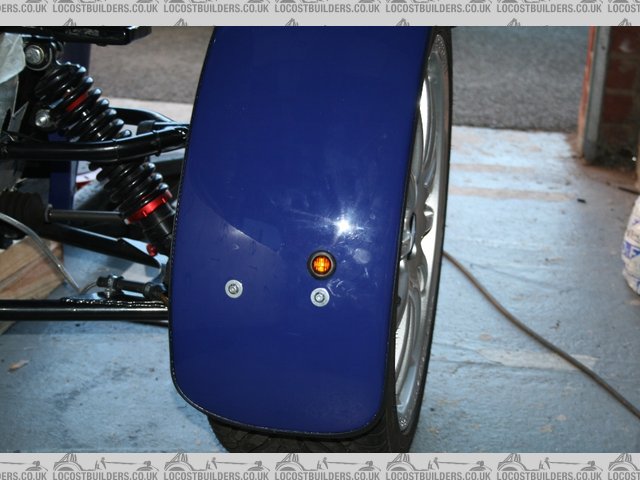The simplest solution is to swap the flasher relay with a LED spec replacement that isnt effected by load.
Module CF13 Fix LED Signal Light 3 Pin Electronic Flasher Relay Error FAST Flash
[Edited on 27-9-13 by loggyboy]

I'm normally quite good at electrics, but I'm having a bit of brain fog at the moment...
All of my lights are now wired up and working correctly, but I need to add a couple of side repeaters. Front and rear indicators are normal bulbs.
The side repeaters that I have are LED's from CBS.
I know that the load on the indicator relay from the normal bulbs is sufficient to get the correct flash rate, so is there any reason why I cannot
simply splice a wire into the live feed to my existing indicator bulbs to feed the LED repeaters and then run the other wire from the LED to earth. I
know that LEDs have very low resistance compared to bulbs so I don't want to create what might amount to a short circuit. I guess that I could
put the LED in series with the indicator bulb, but I have a feeling that this will eventually fry the LED.
I should know the answer to this, but as I say, Friday morning brain fog has kicked in!
The side repeaters will have their own resistor internally (well, mine do) so I think you can just treat them exactly as a normal bulb (except that if you wire them the wrong way round they will act as if not connected).
If they are are sold as 12V repeaters then they already have a current limiting resistor built in, and you can simply wire them in parallel with the existing indicators.
As usual, this site is the font of all knowledge (well, at least the important stuff). And almost instantaneous too - 4 minutes from posting the question to getting an answer on this occasion. Thanks guys.
Its unlikely they will have limiting resistors in them, more likely that they are 12v rated LEDs, so load resistors may still be needed to stop the
relay thinking a bulb has blown.
The simplest solution is to swap the flasher relay with a LED spec replacement that isnt effected by load.
Module CF13 Fix LED Signal Light 3 Pin Electronic Flasher Relay Error FAST Flash
[Edited on 27-9-13 by loggyboy]
As long as there are still two normal indadescent bulbs on each side you can add LED side repeaters without any effect.
My care came with normal rear indicators but LEDs at the front and side. This meant the single incandescent bulb did not draw enough current to make
the standard flasher relay work at an MOT compliant speed.
I had a choice of changing the flasher relay to a non current dependant type or changing the front indicators over to normal bulbs.
quote:
Originally posted by Not Anumber
As long as there are still two normal indadescent bulbs on each side you can add LED side repeaters without any effect.
My care came with normal rear indicators but LEDs at the front and side. This meant the single incandescent bulb did not draw enough current to make the standard flasher relay work at an MOT compliant speed.
I had a choice of changing the flasher relay to a non current dependant type or changing the front indicators over to normal bulbs.
OK, so we now have a couple of competing theories. As a good scientist (or ex-scientist), I'll wire them up and see what happens, which will be
one of
I) they work as they should
ii) the flash rate goes to pot
iii) I blow the fuse
iv) a black hole is created and the whole planet, followed by the rest of the solar system falls into my garage.
I'll report back in due course (as long as its not (iv)).
"You could have 10 filment bulbs and 1 LED and wired in parallel the LED would draw the current to confuse the relay."
No, this wouldnt make any diference at all.
LEDs draw so little current by comparison with an ordinary bulb that adding a few LEDs in parrallel with the bulbs in an existing working circuit
could not confuse a standard current dependant flasher relay in any way at all.
Most flasher relays are current dependant (they are the cheapest to make)
Of these most are set to work with the current draw from 2 bulbs. Keep these 2 bulbs in place and add a 12 volt LED and the relay will continue
working exactly the same. The LED is almost invisible in terms of current draw.
Take one of the 2x normal bulbs away though and there is now not sufficient current draw for the relay to work correctly, you have reduced the current
load by 50% so the relay will flash twice as quickly. The LED is almost invisible to the relay in terms of it's current draw.
quote:
Originally posted by loggyboy
Its unlikely they will have limiting resistors in them, more likely that they are 12v rated LEDs,
quote:
Originally posted by SteveWallace
OK, so we now have a couple of competing theories. As a good scientist (or ex-scientist), I'll wire them up and see what happens, which will be one of
I) they work as they should
ii) the flash rate goes to pot
iii) I blow the fuse
iv) a black hole is created and the whole planet, followed by the rest of the solar system falls into my garage.
I'll report back in due course (as long as its not (iv)).

